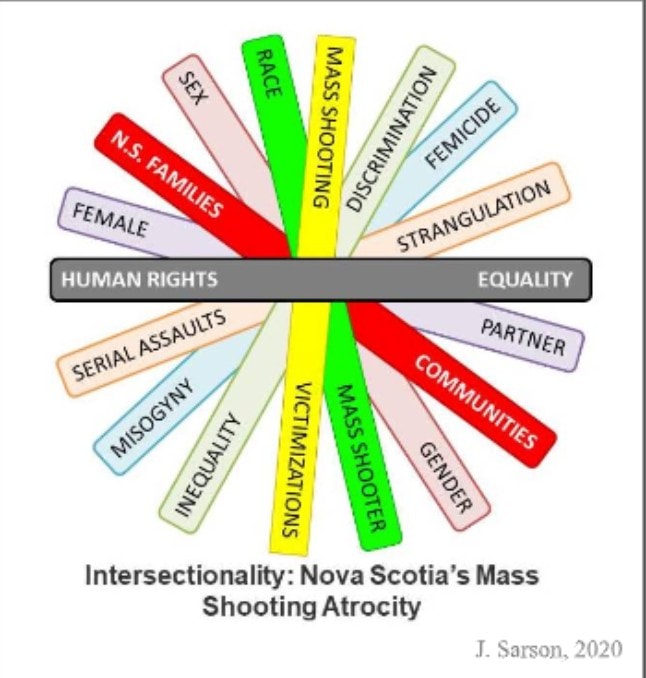
KJIPUKTUK (Halifax) – As feminists it was easy to work with other feminists calling for a feminist analysis to discover a way for mass femicides and homicides to potentially never happen again in this province. For us feminism is not a ‘dirty’ word.
For others the word seems to be scary or spells “danger.” Our call for a feminist analysis was ignored by federal and provincial governmental departments during their deliberations on how to address the mass shooting atrocities of a man whose actions or behaviours can only be described as evil.
Defining feminism globally generally means reaching human rights equality of women and girls in relation to men and boys. This effort focuses on eliminating societal patriarchy that gives male persons domination and privilege and subordinates and oppresses women and girls. The push for women’s and girls’ equality has been concerted global efforts post World War II. Canada, like many countries, has ratified United Nations international human rights treaties in ongoing efforts to confront the social injustices of such inequality to develop a Canadian society that promotes human rights equality for women and girls.
Intersectionality
Asking that a feminist analysis be part of addressing the mass shooting atrocity means naming and exposing the intersectionality of the social issues that created the environment that led to the April mass femicides and homicides. When there is no name for social injustices these become normalized—accepted as the way things are. Acceptance makes social injustices invisible. To fix social injustices, social injustice problems must be named to be made visible. When social injustices come together and are named these can be verbalized as issues of intersectionality.

There were many social injustices in action that created conditions that contributed to the mass shooting victimizations. These are named in the accompanying diagram. Because of the human rights inequality of women, domestic violence by the killer of his female partner was apparently denied, ignored, or community members were uncertain as to what to do.
This is the knowledge shared by Brenda Forbes who tried to warn the RCMP and the community that the killer was a dangerous man. He was a serial assaulter who beat and strangled his partner. The killer was also a harasser and stalker of women. He stalked and threatened Brenda. When Brenda complained to her military boss she said she was told to get used to it because this is the way it is around here—this is the normalized acceptance of a social injustice and misogyny directed towards a woman.
Social injustices include normalizing the choice to be misogynistic which feeds male violence and discrimination against women. Misogynistic attitudes also create resistance to naming and distinguishing femicides from homicides. Acknowledging this difference places responsibility on society to realize women’s relationships with men can be the most dangerous place for women and children—it can involve serial assaults, torture, femicides, homicides, and the killing of children.
Misogynistic attitudes apparently infiltrated the RCMP and other police departments who seemed to have dismissed the killer as a dangerous man who voiced wanting to “kill a cop.” That he had guns—some illegal—seemed not to create red flag warnings about how dangerous a man he was to the police, to his female partner, to the Portapique community, and to other Nova Scotians he knew and did not know. His sex, white race, and professional class gave him privilege. These are social problems that intersected into the most grievous mass shooting in Canadian her-history.
Not acceptable: The Liberal Caucus statement
As Nova Scotia Feminist Fighting Femicide (FFF) we do not accept the written statement put out by Kody Blois, M.P. Chair of Nova Scotia Federal Liberal Caucus, dated July 23, 2020. The statement was signed by the ten Nova Scotian Liberal M.P.s. It states: “The caucus applauds the inclusion in the terms of reference of a feminist analysis in relation to the killer’s troubling history of domestic violence.”
Principled reasons why we do not accept this statement include:
- A feminist analysis, as explained in previous paragraphs, means approaching the many social and structural injustices that contributed to the mass shooting, naming intersectionality issues. This presents a much broader questioning, such as, of the misogyny in the RCMP culture and its impact on how members respond to reports of male violence against women and how misogynistic attitudes shape the responses of communities and bystanders, and the Nova Scotia political culture. A feminist analysis rejects centering solely on “the killer’s troubling history of domestic violence” as written in the Liberal caucus statement. This is not an intersectionality approach.
- The specific term “feminist analysis” is not written in the mandate of the proposed federal-provincial review.
- The specific term “feminist analysis” in also not written into the Independent Review Panel Statement appointed to oversee the proposed federal-provincial review.
- Glaringly absent from the federal-provincial proposed review is equal involvement with the federal office of Maryam Monsef, Minister for Women and Gender Equality Canada (WAGE) and the provincial office of Minister Kelly Regan, Minister of the Status of Women. Actually, the office of Maryam Monsef declined the FFF request for support for a feminist analysis to be included in addressing the mass shooting atrocity. Stating instead that this mass shooting was in the hands of Minister Blair and “outside Minister Monsef’s mandate.” As for the provincial Status of Women office, their website quotes Minister Kelly Regan saying, “Now, more than ever, we understand the need to work together to ensure a strong and resilient approach to the complex issue of domestic violence.” The FFF wrote to Minister Regan with our concerns. She has not replied. Yet both the federal and provincial ministers have mandates to address the intersectionalities of human rights, social inequalities of women and girls, social misogyny, and the relational violence committed predominately by men, including femicides.
Gender-based Analysis Plus (GBA+) rejects a “father knows best” review
GBA+ is about identifying diverse issues. By, for example, challenging assumptions or biases and by seeking multi-viewpoints promotes coming up with facts and potential options that fit into applicable inclusive recommendations. GBA+ educational modules are available on the federal Status of Women website. One resource it refers to is The Urgency of Intersectionality. Intersectionality focuses on how sex, gender, race, and how many structural, systemic, political, social, and geographical factors interact with identity factors to shape lived experiences. The intersectionality approach is essential to transparently revealing what factors contributed to the mass shooting atrocity.
Listening to the federal-provincial Ministers Bill Blair and Mark Furey outline their review showed their presentation was not intersectionality focussed. Instead their review stayed “all in the family” of justice and policing. As mentioned, federal and provincial ministers with mandates for the status of women were excluded in the decision-making in response to the mass shooting femicides and homicides. Minister Furey repeatedly mentioned that a decision-making process occurred that led to the federal- provincial review decision. Evidence does not support this.
Nova Scotia Feminists Fighting Femicide respond
On July 23th 2020 the FFF released a response to the federal-provincial decision to have a review versus an independent public inquiry. Questions asked included:
- Why is there not an open public independent inquiry? This has been requested by families, activists, women’s organizations, politicians, lawyers, many members of the public, and almost 8000 signatures on a petition.
- Why is there no one on the panel that has expertise in misogyny, male violence against women, femicide, and a feminist analysis who is outside of the policing and justice ‘family’ system?
- What is the hurry? To our knowledge no group stated their concern was timeliness, rather the request was for public open transparency.
In closing the FFF is stating that:
- A public independent inquiry with a feminist analysis be called rather than the proposed review;
- An additional panellist that is outside ‘the family’ of policing and judges who has feminist expertise on misogyny, male violence against women, and femicide be added to a panel if the review process remains;
- Following our open letter sent to the members of the Liberal caucus we are seeking from them written evidence that the term and process of a “feminist analysis” has been written into the federal-provincial review terms of reference and in the Independent Review Panel mandate. We have been unable to locate this evidence.

Jeanne Sarson, MEd, BScN and
Linda MacDonald, MEd, BN
Co-founders Persons Against Non-State Torture (NST)
Human Rights Defenders
361 Prince Street, Truro, NS, Canada B2N 1E4
P: 1.902.895.6659 | C: 1.902.956.2117 | twin2@eastlink.ca
www.nonstatetorture.org
contact@nonstatetorture.org
With a special thanks to our generous donors who make publication of the Nova Scotia Advocate possible.
Subscribe to the Nova Scotia Advocate weekly digest and never miss an article again. It’s free!



